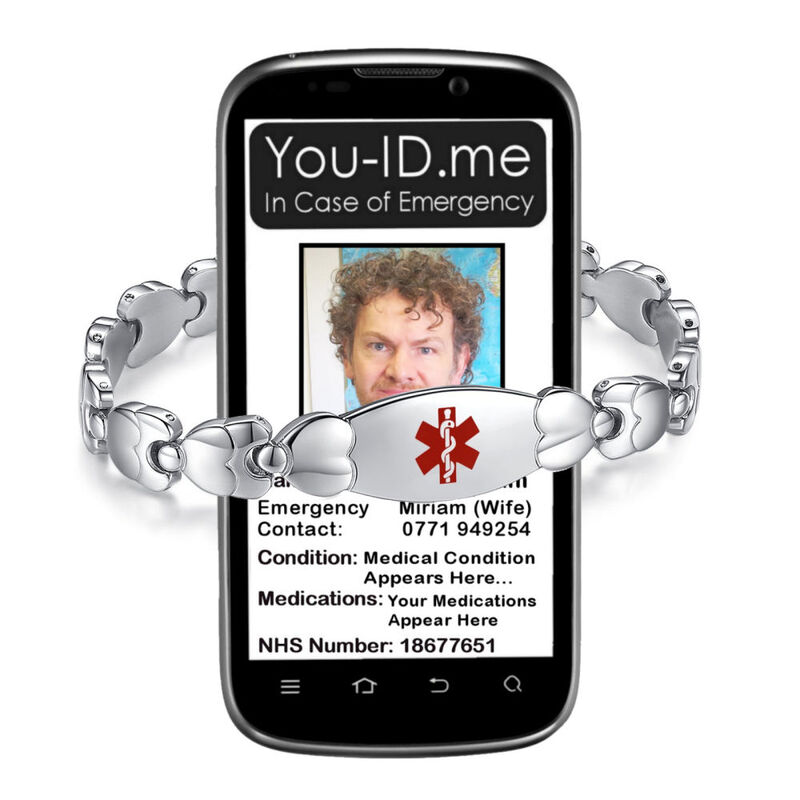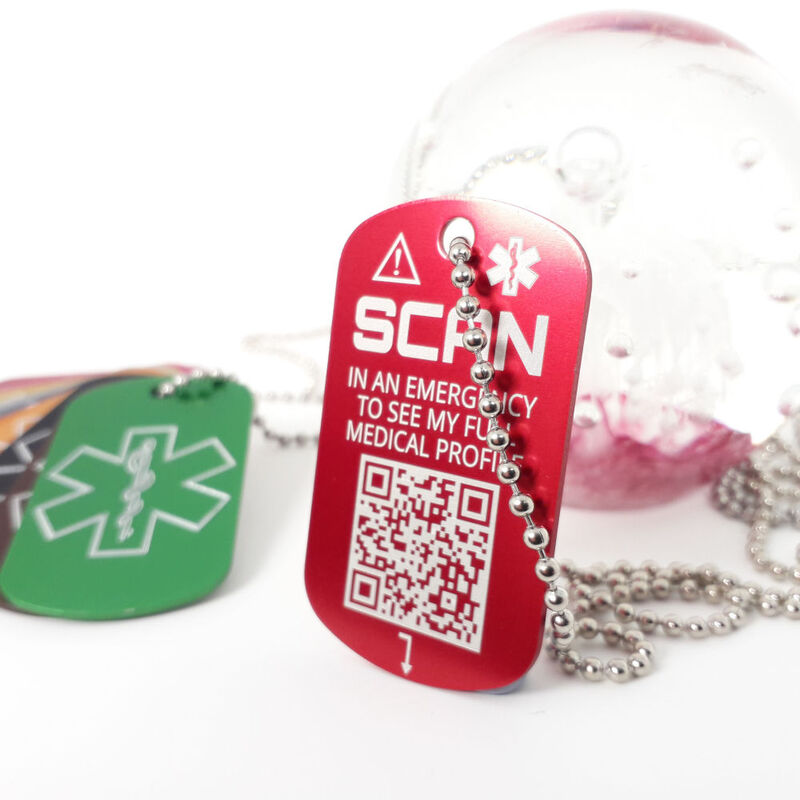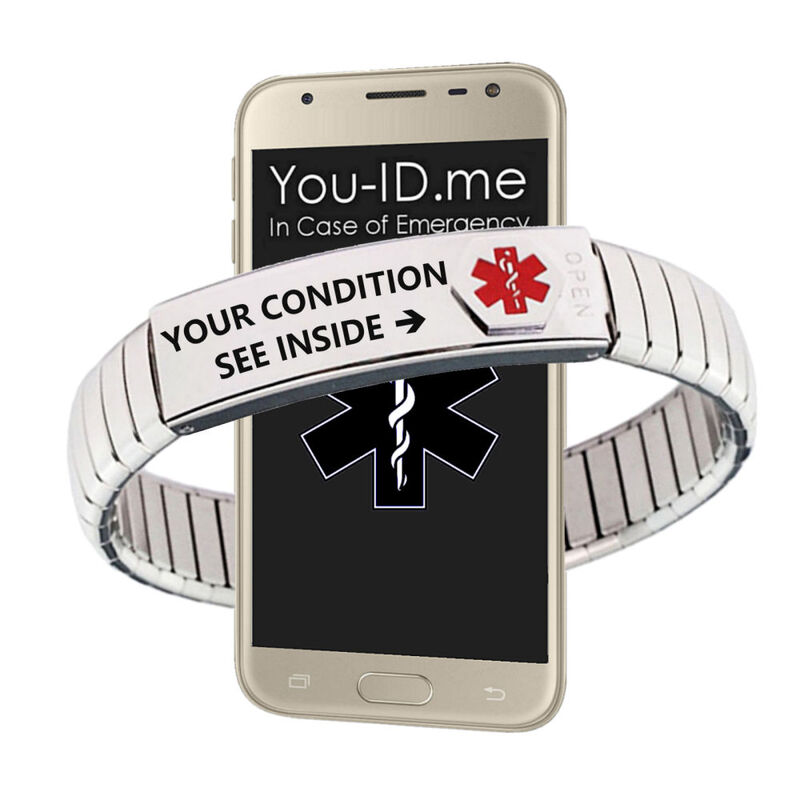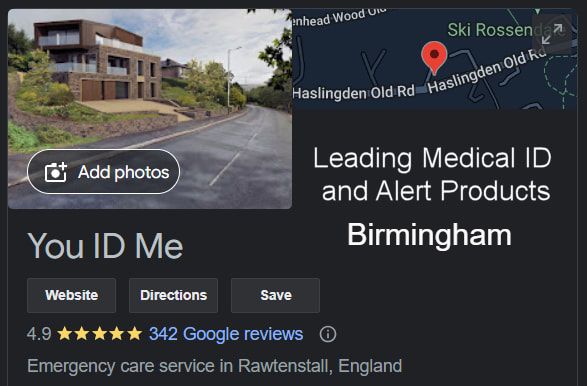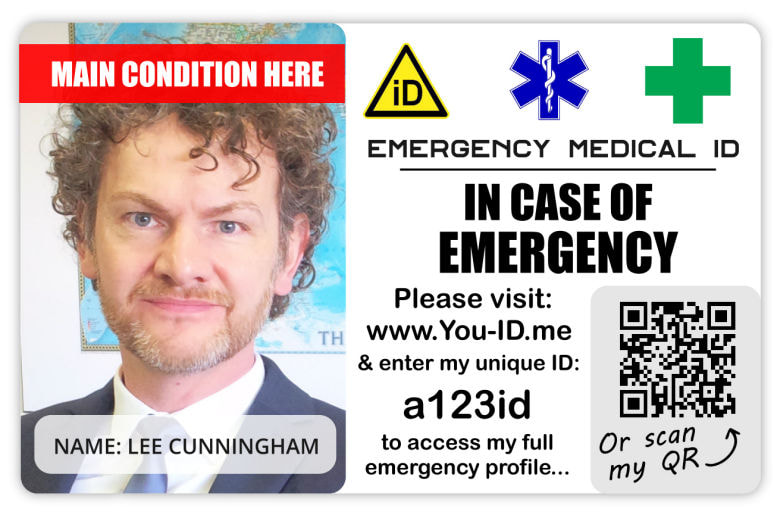|
Birmingham Medical ID: Bracelets, Necklaces, CardsAre you looking for medical ID bracelets, necklaces (jewellery) or medical cards or badges in Birmingham?
Stop for just a moment. Before you buy a medical alert bracelet, necklace, tag, card or badge, have you heard of the You ID Me service? You ID Me is the UK's leading emergency ID and alert service, providing paramedics and first responders with instant access to your vital ID, critical medical info and your emergency contacts' details, to the screen of their device directly from your medical ID product.
You ID Me can also alert your emergency contacts phone to let them know you have a problem. Plus it can share with them the contact details of the paramedic treating you whether that's in Birmingham or elsewhere. With You ID Me there's no more waiting for a knock at the door for your family members. All You ID Me medical alert products have you and your family covered... ...and the best thing is, it's available to you in Birmingham. Popular in Birmingham: Medical ID - Mens & Ladies Bracelets, Necklaces & CardsYou can now buy medical ID bracelets, necklaces, tags or cards in Birmingham that have You ID Me built into them, so that if you have a medical emergency, the first responder that helps you will can quickly and easily get all your vital information - straight to the screen of their mobile device.
That means they can start giving you better emergency care sooner. |
VideosWatch a You ID Me Explainer Video...
Watch a 60 Second Demonstration of You ID Me in Action...
Listen to Speak4me Talking to Paramedics...
|
How Medical ID Products Work with You ID Me
|
All our medical ID products are either engraved or printed with a unique ID.
Users activate their unique ID by registering the information they 'd like to be shared in case of emergency. Registration is quick and easy. You ID Me has two service plans. Gold and Platinum: -
When you wear or carry a medical alert product from You ID Me in Birmingham three key things can happen in an emergency: -
* Platinum plan subscribers only |
Local delivery right across the UKBest Selling |
Related Health Index & Medical Info: Birmingham
The Health Index offers a comprehensive measure to understand health dynamics across various locales. It yields a single figure representing overall health, facilitating comparisons and tracking health trends over time. This metric delves into health at different levels - from local authorities to national, allowing for detailed analyses across specific areas or health topics. Initially focusing on England, there's an ambition to expand its reach throughout the UK. This tool's flexibility and depth make it invaluable for assessing and comparing health outcomes and influencing factors across regions.
Birmingham's latest Health Index score is a reflective measure indicating slight improvements in the city's overall health status, reaching 84.1 in 2021. This figure, although marking a modest increase of 0.9 points from the previous year, places Birmingham in the lower echelon nationally, specifically in the bottom 10% of English local authority areas. A score exceeding 100 suggests better health relative to the 2015 English average, making Birmingham's score indicative of relatively poorer health outcomes.
Particularly, Birmingham shows its strongest performance in the "access to services" subdomain, with a score of 101.7, suggesting better accessibility to primary health services compared to other areas. This contrasts starkly with its lowest-ranking subdomain, "protective measures," which only scored 80.6. The city's health landscape presents a mixed picture, with notable disparities across different health dimensions.
In specific health areas, Birmingham witnessed some progress, such as a slight improvement in "mental health" scores from 2015 to 2021. However, challenges persist, notably in "living conditions," where a slight decline was observed, primarily due to issues like rough sleeping and road safety. Additionally, Birmingham's "access to green space" is comparatively lower than the regional and national averages, underscoring a potential area for public health intervention.
Indicator-wise, the city faces significant health challenges, with the lowest scores recorded in critical areas like infant mortality, personal crime, and cancer screening attendance. These indicators highlight areas requiring urgent attention to improve the overall health and wellbeing of Birmingham's residents.
By focusing on improving these key areas, Birmingham has the potential to enhance its health outcomes, moving closer to the national average and beyond. This requires targeted interventions, addressing both the immediate health service needs and the broader social determinants of health that significantly impact these outcomes.
Birmingham's latest Health Index score is a reflective measure indicating slight improvements in the city's overall health status, reaching 84.1 in 2021. This figure, although marking a modest increase of 0.9 points from the previous year, places Birmingham in the lower echelon nationally, specifically in the bottom 10% of English local authority areas. A score exceeding 100 suggests better health relative to the 2015 English average, making Birmingham's score indicative of relatively poorer health outcomes.
Particularly, Birmingham shows its strongest performance in the "access to services" subdomain, with a score of 101.7, suggesting better accessibility to primary health services compared to other areas. This contrasts starkly with its lowest-ranking subdomain, "protective measures," which only scored 80.6. The city's health landscape presents a mixed picture, with notable disparities across different health dimensions.
In specific health areas, Birmingham witnessed some progress, such as a slight improvement in "mental health" scores from 2015 to 2021. However, challenges persist, notably in "living conditions," where a slight decline was observed, primarily due to issues like rough sleeping and road safety. Additionally, Birmingham's "access to green space" is comparatively lower than the regional and national averages, underscoring a potential area for public health intervention.
Indicator-wise, the city faces significant health challenges, with the lowest scores recorded in critical areas like infant mortality, personal crime, and cancer screening attendance. These indicators highlight areas requiring urgent attention to improve the overall health and wellbeing of Birmingham's residents.
By focusing on improving these key areas, Birmingham has the potential to enhance its health outcomes, moving closer to the national average and beyond. This requires targeted interventions, addressing both the immediate health service needs and the broader social determinants of health that significantly impact these outcomes.
ANY and EVERY Medical Condition in BIRMINGHAM:
We create medical ID products for every medical condition that you can think of, and some that you'd struggle to think of! No one in Birmingham is completely immune to any medical condition which is why we've created a range of medical alert bracelets, emergency ID necklaces and photo medical cards that cover every medical condition possible, here are just a few with a short summary of what each is: -
1. Asthma: Chronic respiratory condition, inflammation.
2. Diabetes: Metabolic disorder, glucose regulation failure.
3. Hypertension: Persistently high blood pressure.
4. Osteoarthritis: Degenerative joint disease, pain.
5. Depression: Mood disorder, persistent sadness.
6. Migraine: Severe headache disorder, neurological.
7. Rheumatoid Arthritis: Autoimmune joint inflammation, chronic.
8. Heart Disease: Cardiovascular system dysfunction, various.
9. Epilepsy: Neurological disorder, recurrent seizures.
10. Chronic Kidney Disease: Gradual loss of kidney function.
11. Anxiety Disorders: Persistent, excessive fear or worry.
12. Bipolar Disorder: Mood disorder, extreme mood swings.
13. Alzheimer’s Disease: Progressive neurodegenerative disease, memory loss.
14. Parkinson’s Disease: Neurodegenerative disorder, movement difficulties.
15. Schizophrenia: Mental disorder, impaired thought processes.
16. Chronic Obstructive Pulmonary Disease (COPD): Chronic inflammatory lung disease, airflow blockage.
17. Irritable Bowel Syndrome (IBS): Gut disorder, pain, bloating, diarrhoea.
18. Celiac Disease: Autoimmune disorder, gluten intolerance.
19. Crohn’s Disease: Inflammatory bowel disease, chronic inflammation.
20. Ulcerative Colitis: Chronic inflammatory bowel disease, ulcers.
21. Multiple Sclerosis: Autoimmune disease, central nervous system.
22. Psoriasis: Skin disease, rapid skin cell production.
23. Lupus: Autoimmune disease, affects multiple organs.
24. Acne: Skin condition, oil glands infection.
25. Eczema: Skin condition, inflammation, itchiness.
26. Gout: Arthritic condition, uric acid crystals.
27. Chronic Fatigue Syndrome: Long-term fatigue, pain, without cause.
28. Fibromyalgia: Widespread musculoskeletal pain, fatigue, sleep.
29. Lyme Disease: Tick-borne illness, bacterial infection.
30. HIV/AIDS: Virus attacking immune system, chronic.
31. Hepatitis: Inflammation of the liver, viral.
32. Tuberculosis: Infectious disease, affects lungs primarily.
33. Malaria: Mosquito-borne infectious disease, parasites.
34. Dengue Fever: Mosquito-borne viral illness, severe flu-like.
35. Zika Virus: Mosquito-borne viral disease, birth defects.
36. Chikungunya: Mosquito-borne viral disease, joint pain.
37. Osteoporosis: Bone disease, decreased density, fragile.
38. Sickle Cell Disease: Genetic blood disorder, misshapen red cells.
39. Haemophilia: Blood clotting disorder, excessive bleeding.
40. Anaemia: Blood disorder, lack of red cells.
41. Thyroid Disorders: Thyroid gland dysfunction, hormonal imbalance.
42. Adrenal Insufficiency: Adrenal glands produce insufficient hormones.
43. Pancreatitis: Inflammation of the pancreas, painful.
44. Gallstones: Hardened deposits in the gallbladder.
45. Appendicitis: Inflammation of the appendix, acute.
46. Meningitis: Inflammation of brain and spinal cord membranes.
47. Encephalitis: Inflammation of the brain, infection or autoimmune.
48. Polycystic Ovary Syndrome (PCOS): Hormonal disorder, women, cysts on ovaries.
49. Endometriosis: Tissue similar to uterine lining grows outside uterus.
50. Prostate Enlargement: Benign prostatic hyperplasia, urinary problems.
51. Erectile Dysfunction: Inability to maintain an erection, sexual dysfunction.
52. Premenstrual Syndrome (PMS): Symptoms before menstruation, physical and emotional.
53. Menopause: End of menstrual cycles, women, hormonal changes.
54. Infertility: Inability to conceive after one year of trying.
55. Cystic Fibrosis: Genetic disorder, affects lungs and digestive system.
56. Pulmonary Fibrosis: Lung disease, scarred and damaged tissue.
57. Legionnaires’ Disease: Bacterial lung infection, severe pneumonia.
58. Pertussis (Whooping Cough): Highly contagious bacterial infection, severe coughing.
59. Scarlet Fever: Bacterial illness, rash, fever.
60. Chickenpox: Viral infection, itchy rash, blisters.
61. Measles: Viral infection, rash, fever, highly contagious.
62. Rubella (German Measles): Viral infection, rash, mild fever.
63. Influenza (Flu): Viral infection, respiratory symptoms, fever.
64. Common Cold: Viral respiratory infection, mild symptoms.
65. Bronchitis: Inflammation of the bronchial tubes, cough.
66. Sinusitis: Inflammation of the sinuses, congestion.
67. Otitis Media: Middle ear infection
68. Otitis Externa: Outer ear infection, swimmer's ear.
69. Conjunctivitis: Eye infection or allergy, pink eye.
70. Cataracts: Clouding of the eye's lens, vision loss.
71. Glaucoma: Eye condition, increased pressure, vision damage.
72. Macular Degeneration: Eye disease, loss of central vision.
73. Diabetic Retinopathy: Diabetes complication, eye damage.
74. Dry Eye Syndrome: Eyes don't produce enough tears, discomfort.
75. Uveitis: Inflammation of the uvea, eye swelling.
76. Keratoconus: Cornea thins and bulges, vision distortion.
77. Strabismus: Misaligned eyes, lack of coordination.
78. Amblyopia: Lazy eye, reduced vision.
79. Tinnitus: Ringing or buzzing noise in ears.
80. Hearing Loss: Partial or total inability to hear.
81. Vertigo: Sensation of spinning, balance disorder.
82. Anorexia Nervosa: Eating disorder, extreme weight loss.
83. Bulimia Nervosa: Eating disorder, bingeing and purging.
84. Binge Eating Disorder: Frequent overeating, lack of control.
85. Obesity: Excess body fat, health risk.
86. Malnutrition: Lack of proper nutrition, health decline.
87. Vitamin D Deficiency: Insufficient vitamin D, bone weakness.
88. Iron Deficiency Anaemia: Lack of iron, reduced red blood cells.
89. Scurvy: Vitamin C deficiency, bleeding, weakness.
90. Rickets: Vitamin D deficiency in children, bone softening.
91. Osteomalacia: Soft bones, vitamin D deficiency in adults.
92. Hyperthyroidism: Overactive thyroid, excessive hormone production.
93. Hypothyroidism: Underactive thyroid, insufficient hormone production.
94. Addison’s Disease: Adrenal insufficiency, cortisol deficiency.
95. Cushing's Syndrome: Excess cortisol, hormonal imbalance.
96. Polycystic Kidney Disease: Kidneys develop multiple cysts, function decline.
97. Urinary Tract Infection: Infection in urinary system, painful urination.
98. Kidney Stones: Hard deposits in kidneys, urinary pain.
99. Bladder Cancer: Cancer in bladder, blood in urine.
100. Prostate Cancer: Cancer in prostate gland, urinary issues.
We create medical ID products for every medical condition that you can think of, and some that you'd struggle to think of! No one in Birmingham is completely immune to any medical condition which is why we've created a range of medical alert bracelets, emergency ID necklaces and photo medical cards that cover every medical condition possible, here are just a few with a short summary of what each is: -
1. Asthma: Chronic respiratory condition, inflammation.
2. Diabetes: Metabolic disorder, glucose regulation failure.
3. Hypertension: Persistently high blood pressure.
4. Osteoarthritis: Degenerative joint disease, pain.
5. Depression: Mood disorder, persistent sadness.
6. Migraine: Severe headache disorder, neurological.
7. Rheumatoid Arthritis: Autoimmune joint inflammation, chronic.
8. Heart Disease: Cardiovascular system dysfunction, various.
9. Epilepsy: Neurological disorder, recurrent seizures.
10. Chronic Kidney Disease: Gradual loss of kidney function.
11. Anxiety Disorders: Persistent, excessive fear or worry.
12. Bipolar Disorder: Mood disorder, extreme mood swings.
13. Alzheimer’s Disease: Progressive neurodegenerative disease, memory loss.
14. Parkinson’s Disease: Neurodegenerative disorder, movement difficulties.
15. Schizophrenia: Mental disorder, impaired thought processes.
16. Chronic Obstructive Pulmonary Disease (COPD): Chronic inflammatory lung disease, airflow blockage.
17. Irritable Bowel Syndrome (IBS): Gut disorder, pain, bloating, diarrhoea.
18. Celiac Disease: Autoimmune disorder, gluten intolerance.
19. Crohn’s Disease: Inflammatory bowel disease, chronic inflammation.
20. Ulcerative Colitis: Chronic inflammatory bowel disease, ulcers.
21. Multiple Sclerosis: Autoimmune disease, central nervous system.
22. Psoriasis: Skin disease, rapid skin cell production.
23. Lupus: Autoimmune disease, affects multiple organs.
24. Acne: Skin condition, oil glands infection.
25. Eczema: Skin condition, inflammation, itchiness.
26. Gout: Arthritic condition, uric acid crystals.
27. Chronic Fatigue Syndrome: Long-term fatigue, pain, without cause.
28. Fibromyalgia: Widespread musculoskeletal pain, fatigue, sleep.
29. Lyme Disease: Tick-borne illness, bacterial infection.
30. HIV/AIDS: Virus attacking immune system, chronic.
31. Hepatitis: Inflammation of the liver, viral.
32. Tuberculosis: Infectious disease, affects lungs primarily.
33. Malaria: Mosquito-borne infectious disease, parasites.
34. Dengue Fever: Mosquito-borne viral illness, severe flu-like.
35. Zika Virus: Mosquito-borne viral disease, birth defects.
36. Chikungunya: Mosquito-borne viral disease, joint pain.
37. Osteoporosis: Bone disease, decreased density, fragile.
38. Sickle Cell Disease: Genetic blood disorder, misshapen red cells.
39. Haemophilia: Blood clotting disorder, excessive bleeding.
40. Anaemia: Blood disorder, lack of red cells.
41. Thyroid Disorders: Thyroid gland dysfunction, hormonal imbalance.
42. Adrenal Insufficiency: Adrenal glands produce insufficient hormones.
43. Pancreatitis: Inflammation of the pancreas, painful.
44. Gallstones: Hardened deposits in the gallbladder.
45. Appendicitis: Inflammation of the appendix, acute.
46. Meningitis: Inflammation of brain and spinal cord membranes.
47. Encephalitis: Inflammation of the brain, infection or autoimmune.
48. Polycystic Ovary Syndrome (PCOS): Hormonal disorder, women, cysts on ovaries.
49. Endometriosis: Tissue similar to uterine lining grows outside uterus.
50. Prostate Enlargement: Benign prostatic hyperplasia, urinary problems.
51. Erectile Dysfunction: Inability to maintain an erection, sexual dysfunction.
52. Premenstrual Syndrome (PMS): Symptoms before menstruation, physical and emotional.
53. Menopause: End of menstrual cycles, women, hormonal changes.
54. Infertility: Inability to conceive after one year of trying.
55. Cystic Fibrosis: Genetic disorder, affects lungs and digestive system.
56. Pulmonary Fibrosis: Lung disease, scarred and damaged tissue.
57. Legionnaires’ Disease: Bacterial lung infection, severe pneumonia.
58. Pertussis (Whooping Cough): Highly contagious bacterial infection, severe coughing.
59. Scarlet Fever: Bacterial illness, rash, fever.
60. Chickenpox: Viral infection, itchy rash, blisters.
61. Measles: Viral infection, rash, fever, highly contagious.
62. Rubella (German Measles): Viral infection, rash, mild fever.
63. Influenza (Flu): Viral infection, respiratory symptoms, fever.
64. Common Cold: Viral respiratory infection, mild symptoms.
65. Bronchitis: Inflammation of the bronchial tubes, cough.
66. Sinusitis: Inflammation of the sinuses, congestion.
67. Otitis Media: Middle ear infection
68. Otitis Externa: Outer ear infection, swimmer's ear.
69. Conjunctivitis: Eye infection or allergy, pink eye.
70. Cataracts: Clouding of the eye's lens, vision loss.
71. Glaucoma: Eye condition, increased pressure, vision damage.
72. Macular Degeneration: Eye disease, loss of central vision.
73. Diabetic Retinopathy: Diabetes complication, eye damage.
74. Dry Eye Syndrome: Eyes don't produce enough tears, discomfort.
75. Uveitis: Inflammation of the uvea, eye swelling.
76. Keratoconus: Cornea thins and bulges, vision distortion.
77. Strabismus: Misaligned eyes, lack of coordination.
78. Amblyopia: Lazy eye, reduced vision.
79. Tinnitus: Ringing or buzzing noise in ears.
80. Hearing Loss: Partial or total inability to hear.
81. Vertigo: Sensation of spinning, balance disorder.
82. Anorexia Nervosa: Eating disorder, extreme weight loss.
83. Bulimia Nervosa: Eating disorder, bingeing and purging.
84. Binge Eating Disorder: Frequent overeating, lack of control.
85. Obesity: Excess body fat, health risk.
86. Malnutrition: Lack of proper nutrition, health decline.
87. Vitamin D Deficiency: Insufficient vitamin D, bone weakness.
88. Iron Deficiency Anaemia: Lack of iron, reduced red blood cells.
89. Scurvy: Vitamin C deficiency, bleeding, weakness.
90. Rickets: Vitamin D deficiency in children, bone softening.
91. Osteomalacia: Soft bones, vitamin D deficiency in adults.
92. Hyperthyroidism: Overactive thyroid, excessive hormone production.
93. Hypothyroidism: Underactive thyroid, insufficient hormone production.
94. Addison’s Disease: Adrenal insufficiency, cortisol deficiency.
95. Cushing's Syndrome: Excess cortisol, hormonal imbalance.
96. Polycystic Kidney Disease: Kidneys develop multiple cysts, function decline.
97. Urinary Tract Infection: Infection in urinary system, painful urination.
98. Kidney Stones: Hard deposits in kidneys, urinary pain.
99. Bladder Cancer: Cancer in bladder, blood in urine.
100. Prostate Cancer: Cancer in prostate gland, urinary issues.
Medical ID Delivery in and Around Birmingham
We supply and delivery medical ID products for ANY medical condition to men, women and children in and around Birmingham. Here's a list including the first few characters of our delivery postcodes: -
- Solihull, B91
- Dudley, DY1
- Wolverhampton, WV1
- Walsall, WS1
- Sutton Coldfield, B72
- Redditch, B97
- Bromsgrove, B60
- Stourbridge, DY8
- Halesowen, B63
- West Bromwich, B70
- Smethwick, B66
- Tamworth, B77
- Lichfield, WS13
- Kidderminster, DY10
- Coventry, CV1



